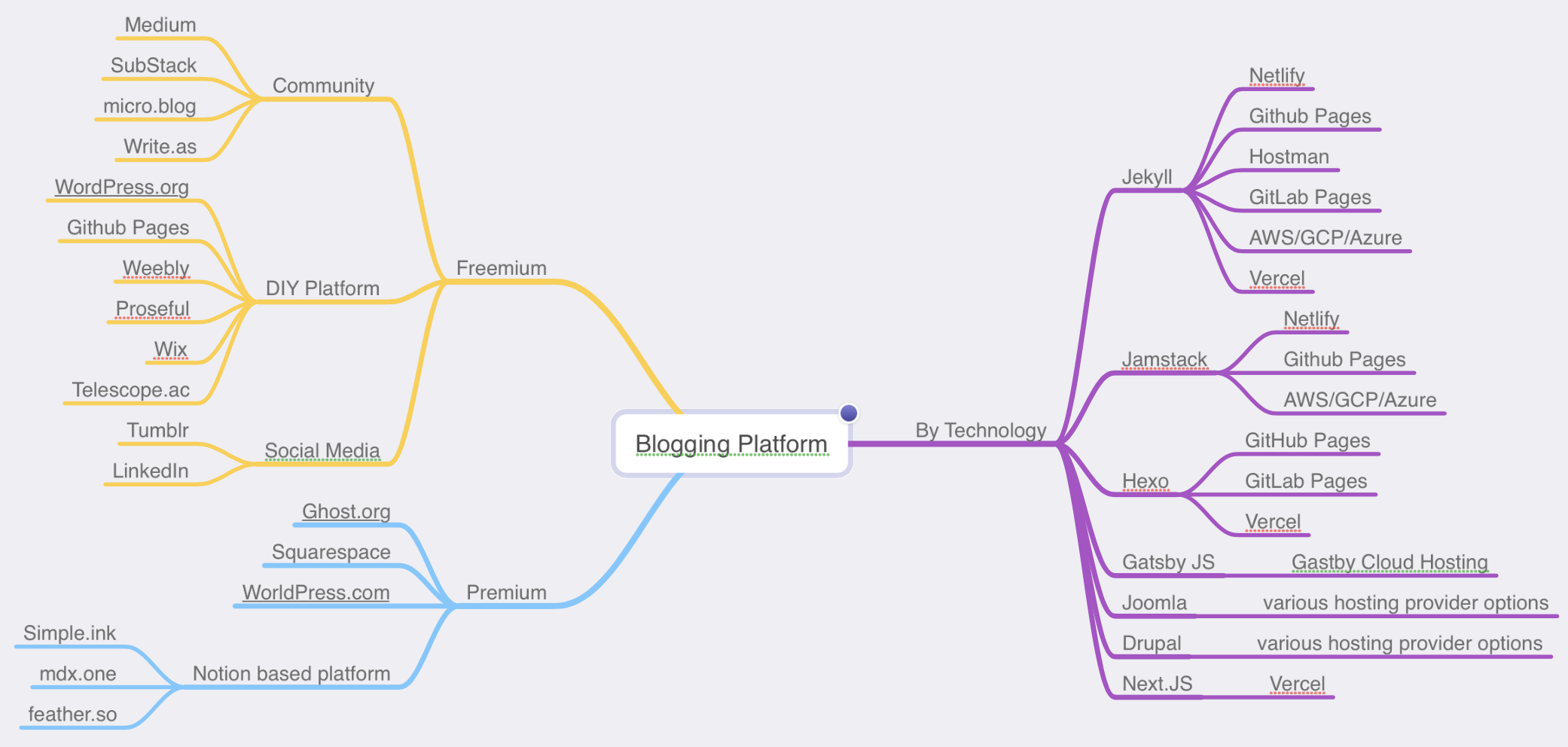I have some down time at this week and decided to reinvent my blog site with new look and organization. This is the first entry after I redesigned and deployed this new site. Throughout the decision making process on the choice of platform and tools, I got some ideas and update to share with you, my friends..
Platforms for blogging or Newsletters
There are criteria that helps to narrow down the options:
- Free or Paid Options 💰
- Self-hosted website, social media or community platforms? 🏠
- Type of content? (blogs, art/design or professional articles) 🧑🏼🎨
- Support of newsletter integration and comment 📰
- Technical capability of you or your team (custom domain setup, Hosting setup, CMS knowledge, VCS, CI/CD flow, General Web Development skills) 🥷🏻
Options
These questions will give a guideline on the path that you can decide for your blog or portfolio website. The following mind map shows a glance of the options that you can pick from.
It’s a lot of options but after browsing through some of these services, you will have an initial idea of the blogging platform that can fit your requirement.
As for non-technical friends that want to kick start a blog, a site like Medium or Ghost is a good start for general bloggers and SubStack for professional writers.
I included “By Technology” for developers and technical guys who want to study or build a website based on a particular JS framework such as Hexo and Jekyll.
Another interesting choice for Notion.so user is blog based on Notion with no-brainer setup.

Why I select GitHub Pages for blogging
If you knows a bit of web development and CI/CD flow, there are options that you can craft website with template and customize before hosting to the hosting services ranged from Github to AWS. This is a decision making flow for mine:
- I was not looking for community blogs like Medium as primary site.
- I don’t want to pay for subscription for using platform except custom domain set up.
- I want to maintain all my blog posts in markdown format locally as backup and also want to customize theme and custom domain.
- Jekyll is my choice of tech stack with markdown editor support
- I mostly blog text with few images.
- I just want to use GitHub to maintain source code and content.
I was using [Github Pages](https://pages.github.com) for ~5 years and it is a good option for tech savvy want to try small website. It is relatively easy to start with user.github.io domain that you can set up custom domain. Remember, It’s ONLY for a static page website and NOT ideal for web applications. I do have Medium account that I posted some of the blogs from my main site as a way to promote using its strong community users.
Other considerations
- It is always ideal to choose the platform or approach that you can backup or export out your blogs for migration to another platform. To avoid platform lock-in.
- Markdown is a must-know markup language for bloggers because many of the platform relies on it. OR use Notion.so for markdown writing and export it out.
- Git version control system if you maintain blog site by yourself.
- Boosting SEO and audience is always a challenge if you set up a self-hosted site or from scratch.
- Communication channel and newsletter integration is not available in free platforms and it needs 3rd party integrations or paid tier in the platforms.
- Custom domain needs to purchase by yourself from namecheap.com or godaddy.com and most freemium sites required a paid tier to set it up.
I hope I help you jumpstart your blogging journey and if there is any questions upon the points I take or mistakes, DM me at twitter🐦.
